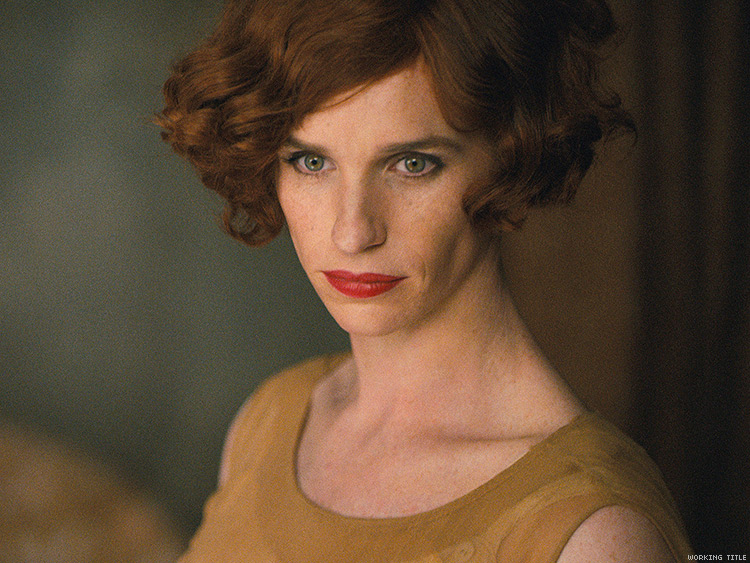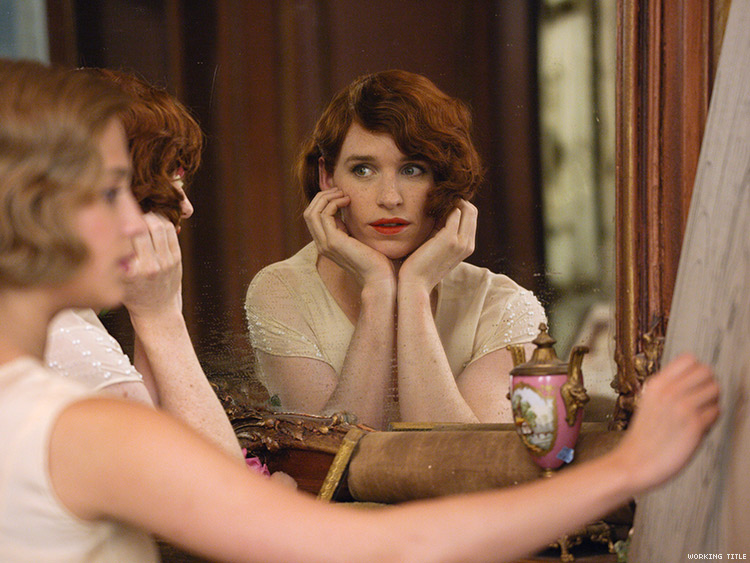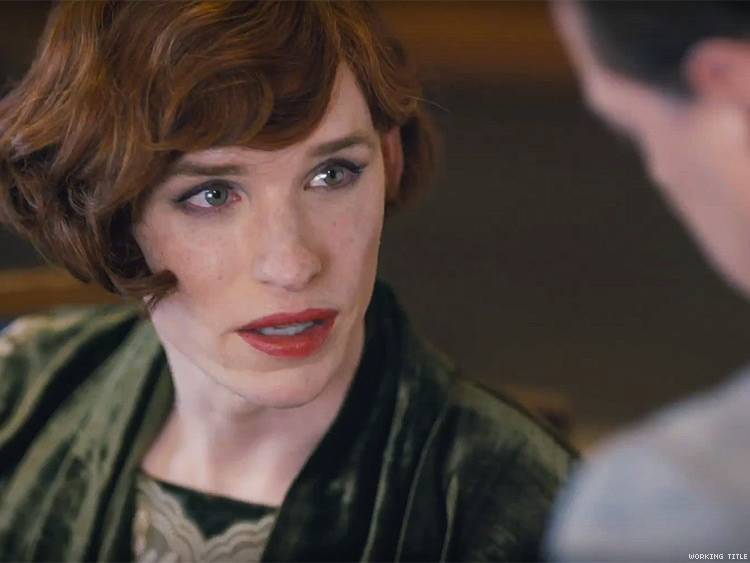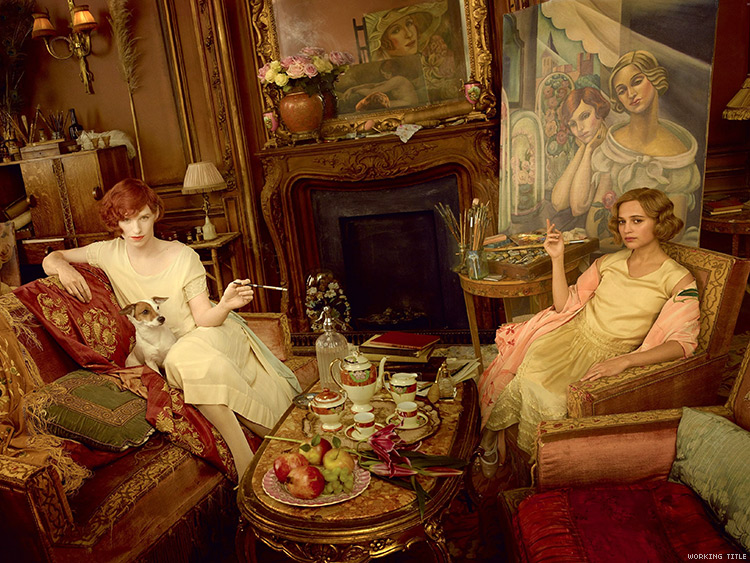The Education of Eddie Redmayne
By Jase Peeples
Originally published: The Advocate 11/25/2015

Eddie Redmayne is visibly nervous when we meet on a rainy September morning in a posh conference room on the fourth floor of the Shangri-La hotel in Toronto. His latest film, The Danish Girl, in which he plays real-life transgender pioneer Lili Elbe, screened the previous evening for the first time a few blocks away — one of several films enjoying its world premiere at the 2015 Toronto International Film Festival. It’s a moment the 33-year-old actor as well as cinema spectators have been anticipating since he leapt from his seat in February to accept the Academy Award for his transformative role as Stephen Hawking in The Theory of Everything and declared, “I am fully aware that I am a lucky, lucky man.”
His role as Elbe in The Danish Girl — the story of Copenhagen artist Einar Wegener (Elbe), whose gender-affirming surgery in Germany in 1930 is believed to be among the first successful attempts — is being called his most transformative yet, with whispers whizzing through the halls of the festival that Redmayne could claim the Best Actor Oscar for a second year in a row.
The pressure on Redmayne is palpable, but as he tugs on the collar of the powder blue shirt peeking from beneath his navy cashmere sweater, he insists it isn’t the expectations of his acting abilities that have him feeling anxious. Instead, it’s the opportunity he has to help educate cisgender (nontrans) people about the realities trans people continue to face — and he wants to get it right.
“When I began preparing for this role and I heard statistics like 41 percent of trans people have considered suicide, learned about the amount of abuse that continues to occur, or the discrimination that’s still legal in so many states — it’s extraordinary. I wanted to know why we aren’t talking more about this,” he says with a warm musicality that contrasts with the sound of cold raindrops drumming against the window. “What I suppose I’m trying to do is learn to be an ally to the community because I feel it’s important for cisgender people to be allies.”

Redmayne says he welcomed the responsibility that came with playing an “icon of the transgender community,” but his understanding of what that entailed grew throughout his time working on The Danish Girl. He is now a firm believer that strong allies are forged not by simply claiming the title and making flowery speeches, but through knowledge. “Ultimately I think it’s about everyone being educated, and these past two years have been a huge education for me and remain so,” he says. “I definitely feel a great privilege in having played Lili and I hope this film will help continue the conversation and education that’s so desperately needed.”
This isn’t the first time Redmayne has portrayed a woman. The actor, born and raised in West London’s affluent Chelsea district, played “a lot of girls’ parts” because of his “petite frame” and the fact that “I look just like my mother” during the years he spent at Britain’s most prestigious boys’ boarding school, Eton, where his classmates included heir to the throne Prince William and fellow actor Tom Hiddleston.
However, Redmayne says those roles did little to expand his understanding of gender. Instead, he feels his education on the subject began just a few years ago, during his time working on Jupiter Ascending with transgender director Lana Wachowski, who shared with him that Man Into Woman (an edited collection of Elbe’s journal entries) “had been such an integral text for her” as well as other favorites she advised he read. “Lana pointed me in the right direction,” he says, letting out a grateful sigh and placing his right hand over his heart. “But my preparation truly started with meeting many trans women from different generations and hearing their stories.”

Redmayne spent months preparing for his role by doing what he believes is essential for every ally: listening to trans people share their experiences. He credits the many people who generously shared stories with informing the choices he made bringing Elbe to life. “One woman talked about when she was transitioning, this period that she called hyper-feminization. A time when you start investigating using makeup, but you use too much or the clothes you choose — you’re going to extremes. She described it as sort of being like a teenage girl’s adolescence when you’re trying things, you’re finding things, and discovering things. That was important to me to bring to my performance.”
The seeds these stories planted within Redmayne blossom throughout the film, including an elegant scene where Elbe is overcome with joy as she tries on costumes before a full-length mirror.
But was there a moment when Redmayne worried he may not be able to do justice to the role of a transgender icon such as Elbe as cisgender actor?
“Absolutely. I felt it every day,” he says. “And I genuinely feel that fear with every part I play. You never feel that you can do it, but you are aspiring to.”
His face lights up and he becomes increasingly animated, a whirlwind of freckles swirling around widening eyes, as he gleefully discusses the intricacies of his craft. “Someone once told me art is not necessarily about talent and all that, it’s about the aspiration of perfection with the acknowledgement that you’ll never get there,” he says. “What I love about my job is there’s an adrenaline-fueled fear of failure, consistently, and you do fail — and I have failed, lots. But eventually I had to take a leap into the unknown and hope I’d do [Elbe’s] story proud, striving for perfection with the acknowledgement that I’d never, ever, get close.”

With the 2016 Oscars rapidly approaching, Redmayne will soon learn whether or not the Academy will recognize his efforts. But regardless of the outcome, he believes his own personal growth and the expanded education he received while working on the film have greatly enriched his life. “In the past, I saw gender as binary, male and female. That was all I knew. But now my opinion has totally changed and I see it as a spectrum,” he says, stretching his arms far apart from one another to illustrate the vast scale. “Even the words masculine and feminine, those terms feel so antiquated, because if that’s the way in which we measure that spectrum, where is the exact point where one becomes the other? All that just seems absurd to me now and that has been a fascinating part of my education.”
In addition to inspiring members of the trans community by respectfully telling the story of an icon, Redmayne hopes The Danish Girl will inspire cisgender people who may have limited knowledge of transgender issues to begin their own expanded education. “I hope others are as inspired by Lili’s story as I was and continue to be,” he says. “At a time in which there were no predecessors that she knew of, she still had the absolute knowledge in herself of who she was and what she needed to do to liberate herself. The fact that she valued life and authenticity enough to give her everything and anything, I think that is extraordinary.”
A knowing smile spreads across his face, and he adds, “It’s such a simple thing to just be yourself, but I don’t think many of us ever find ourselves. We are always questioning, always challenging ourselves, but the idea of aspiring to do that and keeping on doing that is — well, I hope we can all learn from Lili’s leadership and courage.”